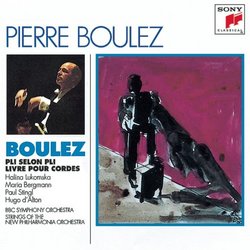| All Artists: Pierre Boulez, Lukomsko, BBC Symphony Orchestra Title: Pli Selon Pli Members Wishing: 2 Total Copies: 0 Label: Sony Release Date: 12/5/1995 Genres: Pop, Classical Styles: Vocal Pop, Opera & Classical Vocal, Symphonies Number of Discs: 1 SwapaCD Credits: 1 UPC: 074646833520 |
Search - Pierre Boulez, Lukomsko, BBC Symphony Orchestra :: Pli Selon Pli
 | Pierre Boulez, Lukomsko, BBC Symphony Orchestra Pli Selon Pli Genres: Pop, Classical
|
Larger Image |
CD Details |
CD ReviewsA masterpiece... 12/04/1999 (5 out of 5 stars) "Yes, so one's idea of a masterpiece is not someone else's idea. Nevertheless, I can't refrain myself, especially since Boulez is often depicted as all brain and no heart. How wrong! OK, so I haven't sat down with the score to do a row analysis of "Pli Selon Pli" -- but knowing Boulez's serial procedures, that might be rather impossible. But when I listen to it, I don't think of all the row forms and permutations (though I do notice a few), but rather the grand sweep, the narrative, the variety of colours and textures, the exquisite vocal writing, and most of all, the sheer beauty of this work. And yes, I did say BEAUTY! This, the Second Piano Sonata, and "Le Visage Nuptial" are my favorite Boulez works. I urge any adventurous souls to get this CD to discover one of the most striking pieces of music from this now-quickly-passing-century." Mallarme never had it so good klangfarbenguy | 01/05/2005 (5 out of 5 stars) "Boulez's masterpiece is "Pli selon pli," a set of five works for varying ensembles and voice. The texts on Mallarme are set exquisitely in the inner works using beautifully angular lines and exotic, ringing, resonant instrumentation. These is a wonderful sense of spaciousness here and Boulez lets you luxuriate in his brilliant, richly painted sound colors. Although the title might suggest dense lines of counterpoint, "Pli selon pli" (and most all of Boulez's work) is more reliant on glittering explosions of sound strung together with the resonances of those explosions connecting them. This may be one of the most beautiful pieces of European avant garde. Boulez has revised "Pli selon pli" several times (other recordings exist on Erato and DG). Each revision has seen an expansion of the instrumentation and added a smoother sheen of sound to the original. I find this regrettable. The grit and daring of the earlier versions is lost among the filigree of the revised versions. Certainly, the revisions are masterful in their orchestration and could only be produced by a musical mind as sophisticated as that of Boulez. But get the early recordings and feel your heart race with the thrill of discovery. " Pli Selon Pli is a work Everyone Should Know klangfarbenguy | 06/04/1999 (5 out of 5 stars) "Pli Selon Pli is one of the masterworks of the twentieth century, written with caution and intelligence in a time when fashion was beginning to turn against the 'modernist' aesthetic, originally incorperating ideas of chance in vogue at the moment ingeniously while not compromizing the ideals of Boulez. While the revisions of Pli Selon Pli have removed actual elements of 'chance performance' (allowing the performers flexibility in the order of sections in the form) as Boulez's vision for the piece crystalized, thus removing the representation of Mallarme's vision of 'a book that would endlessly permutate,' the solidification of form in the 3rd movement clairified Boulez's stance against chance elements he considered arbeitary, which he considered an abberation of the composer's purpose. This element reveals one aspect of Boulez's genius in Pli Selon Pli - While manifestly a portrait of the life of art, an artist (as abstractions) and Stephan Mallarme', it is also a self portrait. The secretive Boulez gives one the feel of the reality that Pli Selon Pli is at times Boulez wearing a Mallarme' mask, which is really one of the points of the work. To be engima is what is implied by the title 'a fold within a fold.' The quality of the performance and the sound quality of the recording is not immaculate, but the ensembles and recording technology available today are perks of 20 years of advancement from the time of this recording. As this is the only recording that I know of for Pli Selon Pli still available, it is a steal for the price of approximatly ten dollars, at which it is offered here."
|

 Track Listings (7) - Disc #1
Track Listings (7) - Disc #1